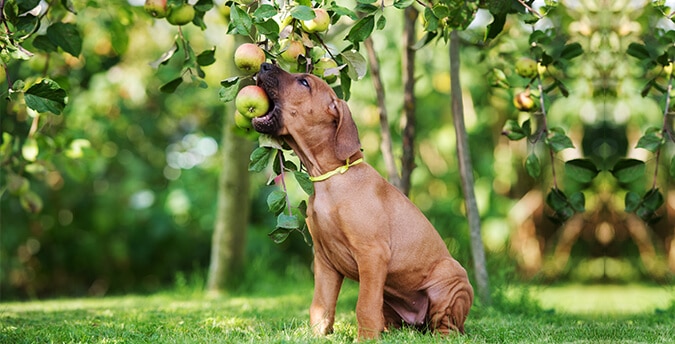Can Dogs Eat Apples?

You know what they say: an apple a day keeps the doctor away!
While this is certainly true for humans, you might be wondering whether that same advice also applies to dogs. Is it safe for a dog to eat an apple? Or can it cause harm?
In this post we’re going to explore everything you need to know when it comes to giving dogs apples. Are they safe and healthy? What are the risks? What are the best ways to feed dogs apples?
But first, let’s answer that initial question: can dogs eat apples?
The good news is that, yes, they can. There are some caveats and some tips you need to follow though, so keep reading!
ARE APPLES SAFE FOR DOGS? HOW MUCH CAN YOU GIVE THEM?
While it is safe for you to give dogs apples, you should also keep in mind that it’s important that you keep them limited and don’t overdo it.
This is an occasional treat. And it’s something that you can use just to add a little extra nutrition to their regular diet. This is not a cornerstone of a dog’s diet and it’s not something you should use without carefully considering what else they’ve been eating.
The reason that you shouldn’t give your dog too much apple is that it is high in sugar. And sugar is a very serious issue potentially for dogs.
When you give your dogs sugar you need to remember that they are comparatively much smaller than you. Even a big dog is considerably smaller than a person!
Thus, when you give them a little bit of sugar, you are giving them a lot more than you might at first think!
Not only that, but dogs also need even less sugar than that. That’s because the dog diet is different from a human’s diet. While we are predominantly omnivores, dogs are predominantly carnivores. That means they primarily desire vegetable, fruit, and grain-free dog food. They are descended from wolves, and those wolves would have gotten most of their nutrition by tracking their prey in the wild! When was the last time you saw a wolf stop to pick some apples?
As we’ll see in a moment, this doesn’t mean that your dog can’t benefit from a little fruit and vegetables, it just means that you need to be careful with it and really think about what you’re doing.
What happens if you give a dog too many apples?
The first thing that can be an issue is that the sugar can build up in the blood stream. If your dog seriously overdoses on apples, then this can be a big problem in the short term and may even be lethal – the amount of inflammation it can cause and the damage it can do to the nerves can become severe and this can lead to a heart attack or other fatal problems.
This is unlikely, though. More likely is that your dog will overindulge in apples over the long term, and that the amount of sugar they’re consuming will often be above the recommended daily limit. If you keep doing this, then you will be continuously spiking their insulin levels. Insulin is a hormone released by both humans and dogs in response to high blood sugar. Its job is to absorb that sugar which can then be used as fuel for energy-demanding tasks, or that can be stored as fat. We need insulin, therefore, in order to make use of the energy supply in our bodies.
If you keep repeating this process over and over – consistently giving your dog a diet that consists of large amounts of apple – then it can be damaging because eventually the body will adapt and stop producing as much insulin. Thus, your dog won’t be able to utilize any more sugar as it comes in and that can cause it to build up in the blood where it can be highly damaging – potentially leading to nerve damage, causing blindness, and leading to a whole host of other serious issues.
This of course is how diabetes is caused – and this is actually a fairly common issue for dogs as it is for humans (note that dogs don’t tend to get diabetes in the wild!).
Even if your dog doesn’t go this far, you may find that eating lots of apples can lead to unwanted weight gain, or issues with energy management that cause lethargy and other problems.
The other potential issue with apples is that they are very high in fiber. Now I know what you’re thinking: isn’t that a good thing?
Yes, in the right quantities, fiber can be a good thing. But if you get too much fiber, then it can become a problem. Too much fiber for dogs can lead to digestion problems and issues with their bowel movements. This leads to constipation or diarrhea, and that means you’re going to have a hard time picking it all up outside! Not only that, but it can also impair absorption and make it harder for dogs to get useful benefits from the rest of the food in their diet!
So, too much of a good thing is definitely possible.
